The Midnight Story Blu-ray Movie
HomeThe Midnight Story Blu-ray Movie 
Kino Lorber | 1957 | 90 min | Not rated | No Release Date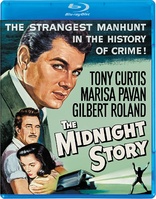
Price
Movie rating
7 | / 10 |
Blu-ray rating
| Users | 0.0 | |
| Reviewer | 3.5 | |
| Overall | 3.5 |
Overview
The Midnight Story (1957)
When a San Francisco priest is murdered a policeman who's a close friend starts an investigation.
Starring: Tony Curtis, Marisa Pavan, Gilbert Roland, Jay C. Flippen, Argentina BrunettiDirector: Joseph Pevney
| Film-Noir | Uncertain |
| Crime | Uncertain |
| Drama | Uncertain |
| Mystery | Uncertain |
Specifications
Video
Video codec: MPEG-4 AVC
Video resolution: 1080p
Aspect ratio: 2.35:1
Original aspect ratio: 2.35:1
Audio
English: DTS-HD Master Audio 2.0 Mono (48kHz, 24-bit)
BDInfo verified
Subtitles
English SDH
Discs
Blu-ray Disc
Single disc (1 BD)
Playback
Region A (locked)
Review
Rating summary
| Movie | 3.5 | |
| Video | 4.5 | |
| Audio | 5.0 | |
| Extras | 2.5 | |
| Overall | 3.5 |
The Midnight Story Blu-ray Movie Review
Reviewed by Dr. Svet Atanasov January 3, 2022Joseph Pevney's "The Midnight Story" (1957) arrives on Blu-ray courtesy of Kino Lorber. The supplemental features on the disc include exclusive new audio commentary by professor and film scholar Jason A. Ney as well as vintage trailer for the film. In English, with optional English SDH subtitles for the main feature. Region-A "locked".
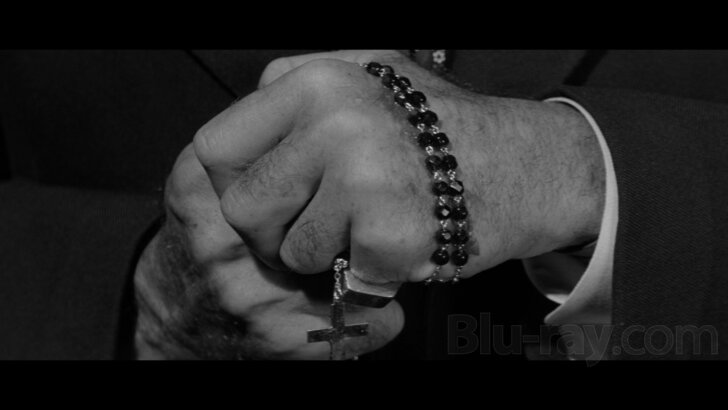
In a quiet, predominantly Italian neighborhood of San Francisco someone murders the beloved Father Giuseppe (John Cliff). On the following day, Joe Martini (Tony Curtis), a traffic cop who has known Father Giuseppe for years, volunteers to find the killer.
At first, Joe is told that he isn’t the right man for the job because of his attachment to Father Guiseppe and lack of experience as a detective, but later on, after he provides what appears to be a legit lead to his superiors, Sgt. Jack Gillen (Jay C. Flippen) backs him up and he is allowed to go to work. Shortly after, Joe approaches Sylvio Malatesta (Gilbert Roland), the owner of a small diner by the docks, while pretending to be a heartbroken old friend of Father Giuseppe looking for a job. Sylvio offers Joe a job and then a room in his house, convinced that his help is exactly what Father Giuseppe must have had in mind for the young man. Then, in a matter of days, Sylvio becomes so impressed by Joe’s somber demeanor and work ethic that he publicly urges him to take his one and only daughter, Anna (Marisa Pavan), to the big dance everyone in the neighborhood has been talking about. Initially, Joe agrees to do it only because it is good for his investigation, but then quickly falls in love with Anna and eventually proposes to her.
While preparing to start a new chapter in his life with Anna, Joe desperately tries to uncover as much evidence as possible proving his initial suspicion that Sylvio might be responsible for Father Guiseppe’s death wrong, but the closer he becomes with his future father-in-law, the more it begins to look like he is hiding a terrible secret.
The original material for Joseph Pevney’s The Midnight Story apparently came from Edwin Blum, who a couple of years earlier had collaborated with Billy Wilder on Stalag 17, as well as John Robinson, who was closely involved with the production of the classic TV series Wanted: Dead or Alive and Dragnet. However, in its current form The Midnight Story is almost certainly a much different film than the one Pevney, Blum and Robinson initially had in mind.
There are a couple of reasons why The Midnight Story must have turned out as it did, but the most significant one has to do with the manner in which Curtis and Roland’s performances shape up the drama. Indeed, up until the moment where Curtis is introduced to Pavan it is very easy to tell that the undercover mission is supposed to generate virtually all of the excitement. This particular relationship between the undercover mission and the drama is primarily responsible for the film’s noirish overtones as well. However, its importance is very quickly diminished by the intimate relationship that materializes between Curtis and Roland, which effectively and permanently moves the film to a completely different place. Here the murder of Father Giuseppe seems like a ruse that allows for a completely different type of drama to flourish. What kind exactly? It very much reminds of the drama that became prominent in some of the films the likes of Alberto Lattuada and Pietro Germi directed toward the end of their lives. It had a light-hearted vintage quality but was in fact incredibly revealing of the daily struggles of working and emerging middle-class Italians from areas of the country with contrasting social and cultural values. (See Come Have Coffee With Us and Alfredo, Alfredo).
The other clue that The Midnight Story must have undergone a significant transformation after it was greenlighted is the insignificant role the city of San Francisco has in it. Indeed, the great Russell Metty was the man behind the camera, but there are only a few sequences where it seems like he is allowed to show what he is capable of. This is quite strange to say the least because the murder of Father Giuseppe actually promises precisely the type of dark and intense film noir one would have expected Metty to lense while working in the area.
The Midnight Story Blu-ray Movie, Video Quality 
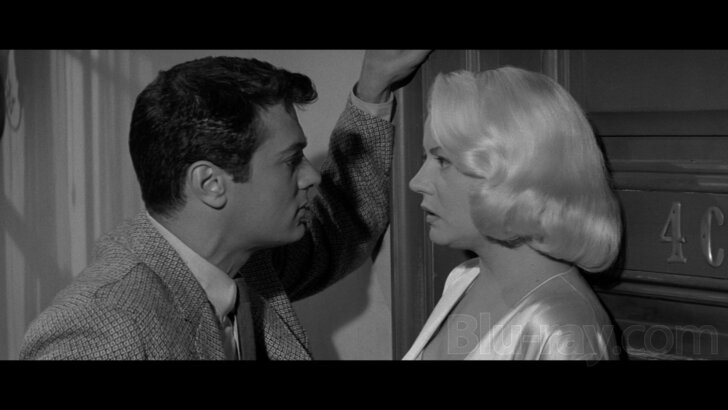
Presented in its original aspect ratio of 2.35:1, encoded with MPEG-4 AVC and granted a 1080p transfer, The Midnight Story arrives on Blu-ray courtesy of Kino Lorber.
At some point the folks at Universal must have redone The Midnight Story because the master they provided to Kino Lorber is very, very good. It reminded me of the one that the studio supplied for The Tarnished Angels, which while older is near flawless.
Excluding a few very minor density fluctuations and a couple of specks, I think that the visuals range from very good to excellent. It is possible that some darker areas could reveal slightly better shadow detail, but I like the current grayscale quite a lot because it does not produce any problematic crushing patterns. Density levels are very strong too, so on a large screen the visuals typically look quite impressive. There are no traces of problematic digital corrections. (In case you are wondering, screencapture #1 does not reveal traces of filtering. It is how the original content is lensed). Image stability is very good. All in all, I was very pleasantly surprised to see how good The Midnight Story looked in high-deifnition. (Note: This is a Region-A "locked" Blu-ray release. Therefore, you must a have a native Region-A or Region-Free player in order to access its content).
The Midnight Story Blu-ray Movie, Audio Quality 
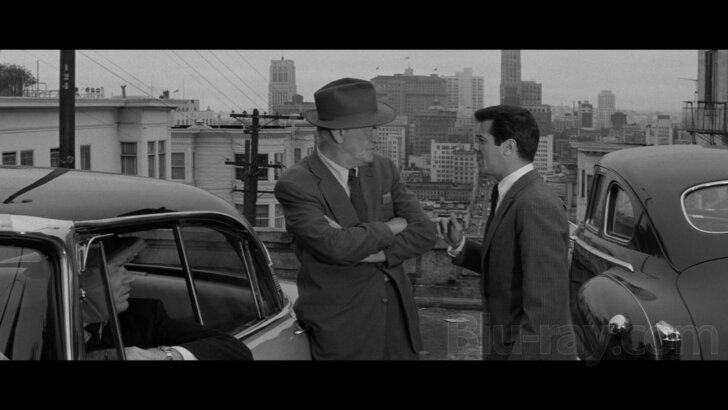
There is only one standard audio track on this Blu-ray release: English DTS-HD Master Audio 2.0. Optional English SDH subtitles are provided for the main feature.
The quality of the audio track makes it even easier to speculate that at some point The Midnight Story was properly remastered. It is very clear, sharp, and nicely balanced. There are a few areas where the music becomes quite prominent and sounds great, too. In the upper register there are no traces of ageing.
The Midnight Story Blu-ray Movie, Special Features and Extras 
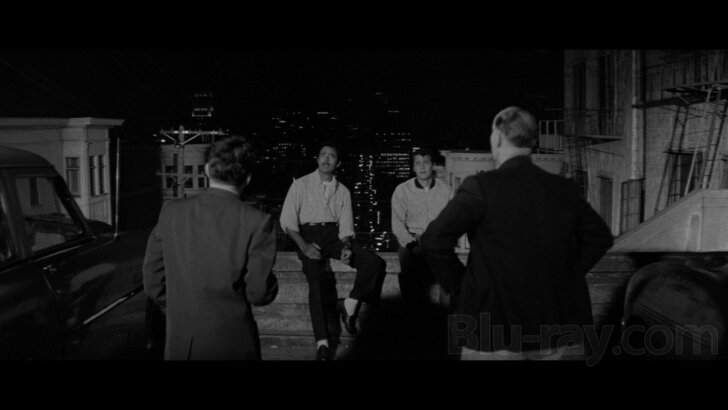
- Commentary - this is another very nicely researched and presented commentary by professor and film scholar Jason A. Ney. It offers plenty of information about the production of The Midnight Story, its style and tone, the careers of some of the people that made it, certain trends in film noir, etc.
- Trailer - a vintage trailer for The Midnight Story. In English, not subtitled. (3 min).
The Midnight Story Blu-ray Movie, Overall Score and Recommendation 
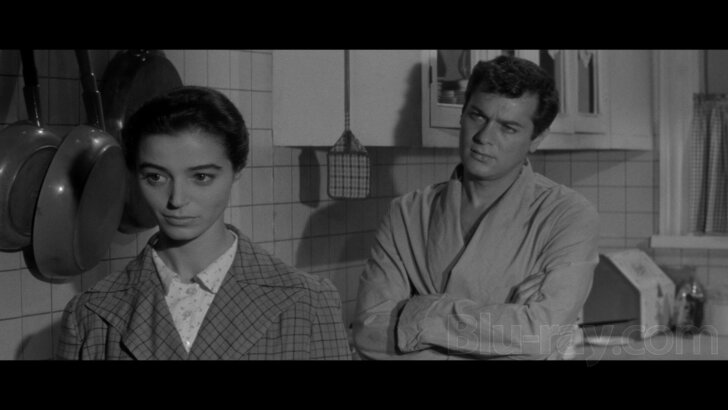
While there are some noirish overtones in Joseph Pevney's The Midnight Story, labeling it film noir seems like quite a stretch. On the other hand, the overactive speculator in me is fairly certain that it was conceived to be a film noir but for different reasons it evolved into what it is now. It is a decent film with memorable performances by Tony Curtis and Gilbert Roland that is worth seeing. However, even though the creators of the film clearly wanted the spotlight to be on the former, the latter is actually a lot more impressive. Kino Lorber's release is sourced from a very solid organic master that was supplied by Universal Pictures. It is included in Film Noir: The Dark Side of Cinema V, a three-disc box set. RECOMMENDED.
Similar titles
Similar titles you might also like
(Still not reliable for this title)

Phantom Lady
1944

The Stranger
1946

Pitfall
1948

My Gun Is Quick
1957

Crossfire
Warner Archive Collection
1947

Jack Irish: Season 2
2018

The File on Thelma Jordon
1950

The Letter
Warner Archive Collection
1940

The Wrong Man
Warner Archive Collection
1956

The Sleeping City
1950

I Wouldn't Be in Your Shoes
Warner Archive Collection
1948

The Shadow on the Window
1957

Outside the Wall
1950

She Played with Fire
1957

Appointment with Danger
1951

T-Men
Special Edition
1947

Kansas City Confidential
1952

The Fearmakers
1958

Beware, My Lovely
1952

Johnny Stool Pigeon
Partners in Crime / Contraband
1949